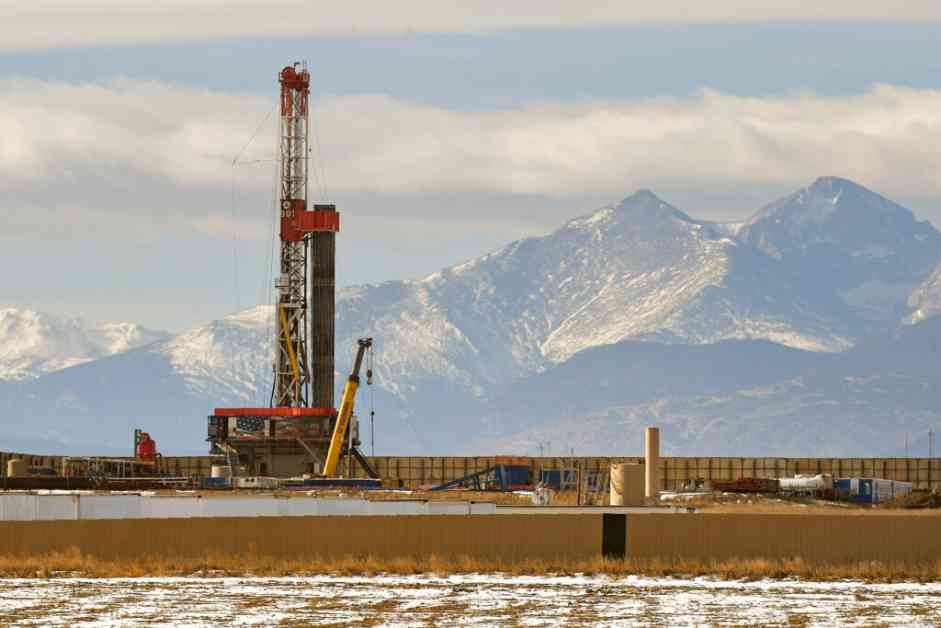The Colorado Water Recycling Mandate: A New Era in Fracking Regulation
Freshwater use in oil and gas drilling is at a tipping point in Colorado, a state facing a historic drought. On a significant Wednesday, March 12th, state regulators unveiled groundbreaking rules mandating drillers to incorporate more recycled water into their operations. This bold move aims to alleviate the strain on dwindling freshwater sources as Colorado’s fossil fuel production skyrockets.
Colorado’s oil and gas industry, contributing nearly 4 percent of the U.S. total crude oil output, consumes a staggering 11 billion gallons of fresh water annually. This figure, equivalent to the volume behind a small dam, represents less than 1% of the state’s total fresh water use. However, it paints a stark picture of the industry’s impact on the state’s water resources.
A Shift in the Hydrological Cycle
As Colorado continues its fossil fuel boom, the Centennial State grapples with a deluge of produced water, a corrosive, brackish byproduct of drilling and fracking. This wastewater brims with salts, metals, and contaminants, rendering it costly and challenging to treat for reuse. Traditionally, oil and gas companies dispose of this wastewater by injecting it into defunct wells and geological formations, severing it from the natural water cycle.
Meanwhile, the demand for fresh water in oil and gas production is projected to surge in the upcoming decade. With deeper vertical drilling and extensive horizontal operations on the horizon, the strain on Colorado’s freshwater reserves is set to intensify.
Recycling Waste: A Statewide Imperative
In a pivotal move in 2023, the Colorado state legislature passed HB23-1242, mandating the Energy and Carbon Management Commission (ECMC) to implement regulations aimed at reducing fresh water usage while increasing recycled water utilization in oil and gas activities. This legislation spawned the Produced Water Consortium, a diverse panel of 31 experts tasked with exploring innovative ways to repurpose produced water.
The Consortium’s diligent research revealed alarming statistics: the oil and gas industry diverts approximately 26,000 acre-feet of water annually for fracking in Colorado, equating to a mere 0.17% of the state’s overall water consumption. Despite this seemingly modest figure, the sheer volume of water allocated for drilling underscores the industry’s thirst for freshwater.
Between July 2023 and March 2024, operators disclosed that they recycled a meager 13% of produced water, with the remaining 87% being disposed of, primarily through injection wells. The Denver-Julesburg basin, a hotbed of drilling activity in Colorado, stands at the epicenter of the industry’s water demand, accounting for three-quarters of total water usage. However, the recycling rate in this basin languishes at a paltry 0.4%.
Roadmap to a Sustainable Future
Under Colorado’s stringent new regulations, oil companies are mandated to incorporate a minimum of 4% recycled produced water by 2026, with the target escalating to 10% by 2030. The ECMC is poised to reconvene in 2028 to establish fresh benchmarks post-2030. Should a consensus elude the panel, the Consortium’s recommendations of 20% recycled water by 2034 and 35% by 2038 will be enshrined into law.
While the onus lies with operators to comply with these recycling thresholds, a credit system has been proposed to incentivize adherence. In instances where operators fall short, they can procure credits from other companies exceeding the recycling benchmarks. However, strict regulatory oversight remains critical to ensure industry compliance.
The path to sustainable water management in Colorado remains fraught with challenges and opportunities. By fostering collaboration between industry stakeholders and environmental advocates, the state is poised to usher in a new era of responsible water usage in oil and gas operations. As the debate rages on, the true litmus test lies in the industry’s ability to adapt to these transformative regulations and embrace a more sustainable future.














